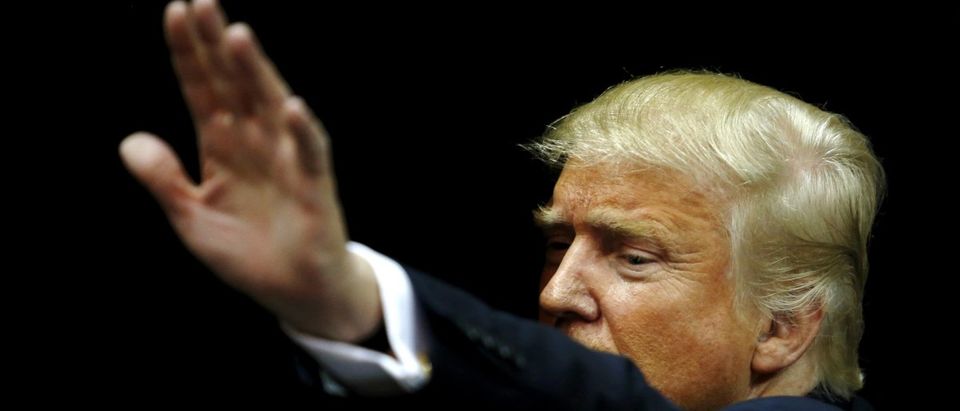The conventional wisdom among political scientists and pollsters is that presidential debates almost never affect who ultimately wins the White House. But 2016 may prove to be an exception. Thanks to the first debate and its aftermath, Donald Trump’s massive mid-September polling surge has vanished. Clinton, with the help of a biased and supportive media, has regained the advantage – even in battleground Ohio, a must-win for the GOP.
The recent pattern is similar to what occurred before and after the Democratic National convention. Before the convention, Trump was surging into a statistical dead heat with the former First Lady. After the convention, Clinton regained the upper hand, and stretched her lead into double-digits– only to lose it again.
The big question now is whether Trump can pull off a third great surge — with less than a month until Election Day. He can but only if he takes his campaign to the next level. Here’s how:
First, return to the central issue of the race: the economy. This is still Trump’s most important edge over Clinton. The vast majority of the country thinks America is heading in the wrong direction, and the failure of Obama’s vaunted recovery to generate real growth and resurgence is at the core of that belief. Clinton has tried to disparage Trump’s business record and judgment, and stigmatize his policy vision. It hasn’t worked.
A corollary to Trump’s laser-like focus on the economy is renewed emphasis on taxes and Obamacare. Politicians have been talking about reforming the tax code for eons. We must give business new tax incentives to invest to grow the economy, and we need to replace Obamacare which has not helped consumers and is thwarting small businesses, too. Trump has recently gained positive attention for his revised tax plan – he needs to highlight it.
Second, project a strong commitment to bipartisanship. Americans are sick of legislative gridlock and the way the extremes in each party have held Congress hostage. Trump can win over wavering voters by promising to end the stalemate in Washington. Earlier in the campaign he talked about all the deals he was prepared to make. Talk about it again — even more loudly. The voters want to hear it.
Third, speak about unifying the country. One of the biggest fears voters have is that America is becoming more divided by race, ethnicity, gender and sexual orientation. Most voters believe that Obama, despite his promise to become a “post-partisan, post racial” president, has divided the country even further. However, these same voters worry that Trump will do the same – or even worse.
Trump needs to do more than say he wants to “represent” everyone. He needs to spell it out: everyone in America has a place at the table: Whites Blacks, Latinos, Asians, immigrants, gay people, and men and women both. America is not as equal as we need to be. Discrimination of any kind must end. But that doesn’t mean privileging one group or issue over another or blaming one group or another for the problems we have.
Fourth, emphasize transparency and trust in government. This is a huge winning issue for Trump. However, rather than try to demonize Clinton – even threatening her with jail time if he’s elected — he should treat the issue more broadly. Only one in five Americans trust the government, and in a democracy that’s a terrible thing. Government should be limited. There are too many regulations that strangle business and too much government intrusion into our daily lives. However, we need our government to work for us and to be accountable and transparent. Obama and Clinton have made it less so.
Fifth, end the hyperbole. Trump has a penchant for describing the policies of the Obama-Clinton years as a “disaster.” The description grabs people’s attention but Trump too often takes his messaging too far. For example, he claims that a policy – like NAFTA – is the “worst trade deal in the history of our country and possibly the world.” NAFTA is bad, but it’s hard to document such a claim. Similarly, he frequently calls Iraq the “worst foreign policy disaster in our nation’s history.” Again, not really true – Vietnam was far worse.
Language and rhetorical style matter, and Trump is losing moderate voters who would like to support him. Part of Clinton’s recurring success has been her ability to turn the race into a referendum on Trump’s character and his “temperament.” Too often when Trump scores, he scores in a way that alienates voters. The point is to win people without compromising your principles. There’s vast space to close the gap here.
It’s obvious that part of Trump’s style is calculated to win over GOP base voters and disaffected working class Democrats, and to keep them pumped up to turn out in November. But Trump’s entered the final phase of the race when appealing to broader electorate is paramount. Moreover, early voting is already underway. A third of the electorate will vote before the official balloting on November 8. There’s no time to lose.
Right now the biggest challenge for Trump is to make the transition – substantively and rhetorically – from anti-establishment antagonist to genuine statesman. Starkly contrast his policy agenda with Clinton’s but also show that he can rise above the fray and unify the country. In other words, “make all of American great again.”
If he can do that, he can still win.


